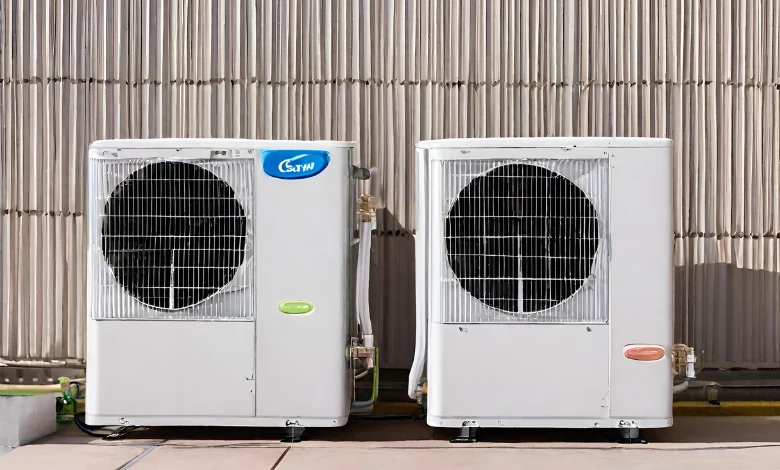The Role of Refrigerants in Enhancing Air Conditioning Performance

In the intricate world of air conditioning, where comfort meets technology, the unsung heroes are the refrigerants. These unassuming substances play a vital role, absorbing and releasing heat to regulate temperatures effectively.
Also read: Best AC in India 2024
This blog delves into the core of air conditioning, unraveling the mechanics and significance of refrigerants. From the basics of performance to the latest technological advancements, join us in uncovering the pivotal role these substances play in enhancing the efficiency, sustainability, and overall performance of air conditioning systems.
I. The Role of Refrigerants in Enhancing Air Conditioning Performance
A. Brief Overview of the Crucial Role of Refrigerants in Air Conditioning
The evolution of air conditioning has significantly improved our comfort in various settings. At the core of this technological marvel are refrigerants, often underappreciated but absolutely essential. Refrigerants are substances that absorb and release heat, enabling the air conditioning process to regulate temperature effectively.
Refrigerants undergo phase transitions, changing from a low-pressure gas to a high-pressure liquid and vice versa. This property allows them to absorb heat from the indoor air and release it outside, creating a cooling effect. Without efficient refrigerants, the air conditioning systems we rely on today would be far less effective.
B. Importance of Exploring How Refrigerants Contribute to Enhancing Performance
As technology advances and environmental concerns grow, understanding how refrigerants contribute to air conditioning performance becomes increasingly important. Refrigerants not only impact cooling efficiency but also play a vital role in energy consumption and environmental sustainability. By exploring these contributions, we can make informed choices that not only enhance performance but also align with broader goals of energy efficiency and ecological responsibility.
C. Purpose of the Blog – To Examine the Specific Ways in Which Refrigerants Improve Air Conditioning Systems
This blog aims to be a comprehensive resource, delving into the intricate details of refrigerants and their impact on air conditioning systems. We will explore the mechanics of refrigerants, specific ways they enhance performance, recent technological advancements, real-world case studies, industry perspectives, and considerations for consumers. By the end, readers should have a deep understanding of the pivotal role refrigerants play in elevating air conditioning performance.
II. Basics of Air Conditioning Performance
A. Definition of Air Conditioning Performance
Air conditioning performance extends beyond merely cooling the air. It encompasses a range of factors such as humidity control, air quality, and energy efficiency. Performance is measured by how well a system can maintain a comfortable indoor environment while minimizing energy consumption and environmental impact.
B. Factors Contributing to Optimal System Functionality Beyond Cooling
Beyond the basic goal of cooling, optimal air conditioning functionality considers factors like the ability to control humidity levels, ensuring air quality, and providing consistent and efficient temperature regulation. These factors collectively contribute to the overall performance of an air conditioning system.
C. The Impact of Performance on User Comfort and Energy Efficiency
The direct impact of air conditioning performance is on user comfort and energy efficiency. A well-performing system ensures that occupants experience a consistently comfortable indoor environment while minimizing energy consumption. This dual emphasis on comfort and efficiency highlights the importance of understanding and optimizing air conditioning performance.
III. The Mechanics of Refrigerants
A. Overview of the Essential Role of Refrigerants in the Cooling Process
To understand how refrigerants enhance air conditioning performance, it’s crucial to grasp their fundamental role in the cooling process. Refrigerants act as heat carriers, absorbing heat from indoor air and releasing it outside. This cycle allows for the regulation of temperature, creating a cooling effect.
B. Heat Transfer Mechanisms and the Refrigeration Cycle
The mechanics of refrigerants involve intricate heat transfer mechanisms and the refrigeration cycle. The refrigeration cycle consists of compression, condensation, expansion, and evaporation. During compression, refrigerant gas is pressurized, raising its temperature. In the condensation phase, the high-temperature gas releases heat to the surroundings and transforms into a high-pressure liquid. The expansion process reduces the pressure, causing the liquid to evaporate and absorb heat. This cycle repeats, facilitating continuous temperature regulation.
C. How Refrigerants Contribute to the Overall Performance of Air Conditioning Units
Refrigerants contribute significantly to the overall performance of air conditioning units. Their ability to efficiently transfer heat and undergo phase transitions directly impacts the cooling capacity and energy efficiency of the system. Choosing the right refrigerant is critical for achieving optimal performance and aligning with environmental goals.
IV. Specific Ways Refrigerants Enhance Performance
A. Improved Cooling Efficiency
1. The Relationship Between Refrigerants and Cooling Capacity
The cooling capacity of an air conditioning system is closely tied to the properties of the refrigerant used. Different refrigerants have varying heat absorption and release characteristics, influencing how effectively they can cool the air. High-quality refrigerants contribute to improved cooling efficiency by efficiently managing heat transfer.
2. High-Efficiency Refrigerants and Their Impact on Temperature Control
Advanced refrigerants with high efficiency play a crucial role in maintaining precise temperature control. These refrigerants enable air conditioning systems to achieve and maintain the desired temperature more effectively, enhancing user comfort and overall system performance.
B. Energy Efficiency
1. The Role of Refrigerants in Energy Consumption
The choice of refrigerant significantly affects the energy consumption of air conditioning systems. Some refrigerants require less energy to achieve the same cooling effect, contributing to overall energy efficiency. This is particularly important in the context of sustainable and cost-effective operation.
2. Energy-Saving Properties of Advanced Refrigerants
Advanced refrigerants often exhibit energy-saving properties, allowing for the same or improved cooling performance with reduced energy consumption. This not only benefits end-users by lowering utility costs but also aligns with broader energy conservation goals.
C. Environmental Impact
1. Introduction to Environmentally Friendly Refrigerants
The environmental impact of refrigerants has gained considerable attention due to the recognition of their role in ozone depletion and climate change. Environmentally friendly refrigerants, such as hydrofluorocarbons (HFCs) with lower global warming potential (GWP), have been developed to address these concerns.
2. How Choosing the Right Refrigerant Can Minimize Ecological Footprint
Selecting the right refrigerant goes beyond performance considerations; it also involves minimizing the ecological footprint. The adoption of environmentally friendly refrigerants contributes to sustainability efforts, aligning with global initiatives to reduce the environmental impact of air conditioning systems.
V. Advancements in Refrigerant Technology
A. Overview of Recent Innovations in Refrigerants
Recent innovations in refrigerant technology highlight the industry’s commitment to continuous improvement. New formulations and designs aim to address not only performance and efficiency but also environmental concerns.
B. High-Performance Refrigerants and Their Benefits
High-performance refrigerants are designed to offer benefits such as enhanced cooling capacity, improved energy efficiency, and reduced environmental impact. These advancements represent a leap forward in the quest for more sustainable and effective air conditioning solutions.
C. The Role of Technology in Pushing the Boundaries of Air Conditioning Performance
Technological advancements play a pivotal role in pushing the boundaries of air conditioning performance. Innovations in refrigerant technology are often intertwined with broader developments in materials science, engineering, and environmental science, driving the industry toward more efficient and sustainable solutions.
VI. Case Studies and Success Stories
A. Examples of Air Conditioning Systems with Notable Performance Enhancements
Examining real-world examples provides valuable insights into how specific refrigerants have contributed to significant performance enhancements in air conditioning systems. Case studies showcase the practical application of advanced refrigerants in diverse environments.
B. Real-World Applications of High-Performance Refrigerants
Exploring real-world applications further illustrates the effectiveness of high-performance refrigerants. From commercial spaces to residential buildings, understanding how these refrigerants perform in different settings informs decision-making for industry professionals and consumers.
C. Lessons Learned from Successful Implementations
Analyzing lessons learned from successful implementations helps refine best practices in the selection and application of refrigerants. Understanding the challenges and successes of past projects guides future endeavors, contributing to the continuous improvement of air conditioning systems.
VII. Industry Perspectives and Trends
A. Insights from Experts on the Role of Refrigerants in Air Conditioning Performance
Gaining insights from industry experts provides a holistic understanding of the current and future roles of refrigerants in air conditioning. Expert opinions shed light on challenges, opportunities, and emerging trends in the dynamic landscape of refrigerant technology.
B. Emerging Trends in Refrigerant Development for Enhanced System Functionality
Exploring emerging trends in refrigerant development reveals the industry’s trajectory toward more advanced and sustainable solutions. Innovations in refrigerant chemistry, design, and application methods indicate a future where air conditioning systems are not only more efficient but also environmentally responsible.
C. Future Expectations for the Integration of Advanced Refrigerants
Anticipating the integration of advanced refrigerants in the future helps industry professionals and consumers stay ahead of the curve. From smart technologies to more sustainable refrigerant options, understanding future expectations guides decision-making and investment in air conditioning systems.
VIII. Consumer Considerations
A. Educating Consumers on the Impact of Refrigerant Choices on Performance
Consumer education is a crucial aspect of ensuring informed decision-making. By understanding the impact of refrigerant choices on air conditioning performance, consumers can make choices that align with their preferences, values, and long-term goals.
B. Making Informed Decisions When Selecting Air Conditioning Systems Based on Refrigerant Features
Empowering consumers to make informed decisions involves providing guidance on selecting air conditioning systems with optimal refrigerant features. This includes considerations such as energy efficiency, environmental impact, and long-term maintenance costs.
C. Consumer Awareness Campaigns Promoting the Importance of Performance-Enhancing Refrigerants
Initiating consumer awareness campaigns is essential to promote the importance of choosing performance-enhancing refrigerants. By emphasizing the benefits of high-performance and environmentally friendly options, these campaigns contribute to a collective effort toward sustainability.
IX. Conclusion
A. Summarize the Critical Role of Refrigerants in Enhancing Air Conditioning Performance
In conclusion, the critical role of refrigerants in enhancing air conditioning performance cannot be overstated. From improved cooling efficiency to energy savings and environmental sustainability, the choice of refrigerant directly influences the overall effectiveness of air conditioning systems.
B. Encouragement for Industry Professionals and Consumers to Prioritize Performance-Driven Refrigerant Choices
This blog encourages both industry professionals and consumers to prioritize performance-driven refrigerant choices. By staying informed about the latest advancements and considering the broader impact of refrigerant choices, individuals can contribute to the ongoing evolution of air conditioning technology.
C. The Evolving Landscape of Refrigerants and Their Pivotal Role in Elevating the Overall Performance of Air Conditioning Systems
The landscape of refrigerants is continually evolving, driven by technological advancements, environmental considerations, and the quest for better performance. As we navigate this evolution, the pivotal role of refrigerants in elevating the overall performance of air conditioning systems underscores the need for collaborative efforts to create a future where comfort, efficiency, and sustainability coexist harmoniously.





